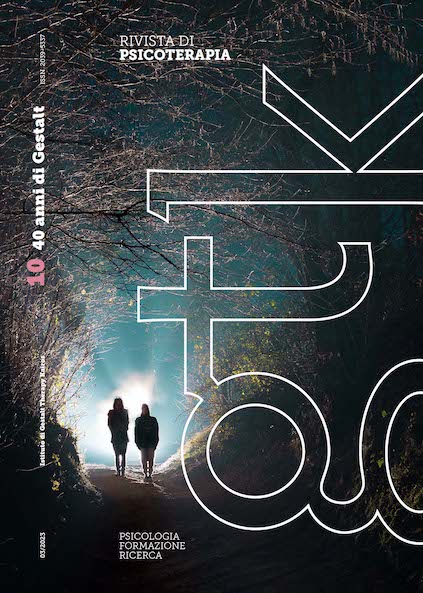ABSTRACT
![]()
L’autore descrive un mutamento del significato del concetto di “campo” nella contemporanea tTerapia gestaltica rispetto a quella affermata da K. Lewin e F. Perls. L’autore argomenta che l’interpretazione moderna del concetto di campo è adatta a descrivere un processo di sperimentazione ma non è adatto a descrivere le relazioni nel senso che intendeva Buber. Vengono descritti alcuni fenomeni che caratterizzano uno spazio dialogico, una combinazione di atteggiamento riverente e appassionata preoccupazione nei confronti dell’Altro, così come il ruolo attivo di uno spazio dialogico in relazione ai partecipanti al dialogo.
![]()
The author describes a change in the meaning of the “field” concept in contemporary gestalt therapy compared to that asserted by K. Lewin and F. Perls and argues that the modern interpretation of the field concept is suitable for describing a process of experiencing but is not suitable for describing relations in Buber’s sense of the word. The relationship between the field and the space of relations concepts is considered. Some phenomena that characterize a dialogic space are described, for example, a combination of a reverent attitude and passionate concern towards the Other, as well as the active role (“subjectness”) of a dialogic space as related to the participants of the dialogue.
Ph.D. (Psychology) is a founder (in 2000) and rector of Moscow Institute for Gestalt Therapy and Consulting. In 2007 – 2012 – member of the EAGT board as a national representative of the Association of Russian-language Gestalt Institutes (ARGI). Expresident of ARGI. Besides private practice Oleg has being teaching gestalt therapy in Russia, Ukraine and Belarus. The author of “Personal Growth in a Therapy group” (1990) and “The Space of Therapy. Experience, Relation, Activity” (2020, both in Russian), chapter on psychosomatic disorders in “Gestalt Therapy in Clinical Practice” (2012, in English, Italian etc.), many articles.

